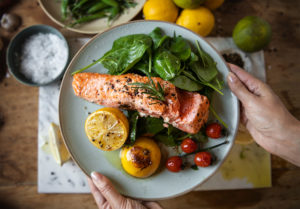
27 Mar Nutrition for Mental Wellbeing
By: Cynthia Schepers – True Up Peer Support Coordinator
National Nutrition Month® is an annual campaign created by the Academy of Nutrition and Dietetics. During the month of March, everyone is invited to learn about making informed food choices and developing healthful eating and physical activity habits.
 As someone who suffers from multiple mental health disorders, I have a huge passion for the role that physical activity and good nutrition have on mental wellness. I graduated from the University of Louisville with a degree in Health and Human Performance with a track in Exercise Science. I am the new Peer Coach Coordinator for True Up and Kentucky Youth Advocates and I plan to use my position, and knowledge from my degree, to advocate for the physical and mental wellbeing of current and former foster youth.
As someone who suffers from multiple mental health disorders, I have a huge passion for the role that physical activity and good nutrition have on mental wellness. I graduated from the University of Louisville with a degree in Health and Human Performance with a track in Exercise Science. I am the new Peer Coach Coordinator for True Up and Kentucky Youth Advocates and I plan to use my position, and knowledge from my degree, to advocate for the physical and mental wellbeing of current and former foster youth.
Most people know that eating healthy balanced meals is important for their physical health, but did you know that your nutrition also has a large impact on your mental health?
Numerous studies show a correlation between healthy eating and positive mental health impact. In recent years there have been lots of studies that look at nutritional impact on mental health. Multiple studies have shown that eating a highly processed diet can lead to certain mental health conditions while showing that a healthy diet could be a preventative measure from developing a mental disorder.(1)
Here are some tips to help you make nourishing your body more accessible:
Reframe the diet mindset: Many people beginning their fitness and nutrition journeys focus solely on their weight, but reframing nutrition as something that could bring positive mental effects could be more sustainable. A diet won’t be effective if only practiced short term, we need to make sure we are creating sustainable habits that will last us a lifetime. It is important to shift our mindsets when it comes to nutrition.The goal of healthy eating should come from a place of self-love and a desire to nurture your body, rather than wanting to change your appearance. Our bodies help us live our fullest lives, so it only makes sense that we help them by giving them the proper fuel and the ability to recover.
Many people beginning their fitness and nutrition journeys focus solely on their weight, but reframing nutrition as something that could bring positive mental effects could be more sustainable. A diet won’t be effective if only practiced short term, we need to make sure we are creating sustainable habits that will last us a lifetime. It is important to shift our mindsets when it comes to nutrition.The goal of healthy eating should come from a place of self-love and a desire to nurture your body, rather than wanting to change your appearance. Our bodies help us live our fullest lives, so it only makes sense that we help them by giving them the proper fuel and the ability to recover.
Make small gradual changes:
Large shifts in your diet and lifestyle, especially all at once, can hinder your long-term nutrition goals. It is important to make small, but permanent changes, so make sure it is something you are willing to commit to.
-Try tackling each nutrition goal individually. For example, add an additional three servings of vegetables per week to your meal plan, then focus on adding or subtracting something else once you’ve mastered the extra veggies you intended to.
-Replace any indulgent snacks with healthier alternatives. For example, if you are someone who eats a lot of potato chips, you could switch them out for baked potato chips, or protein packed almonds.
-Remember, if you slip up and chow down on something unhealthy, that’s completely normal and should not be considered a failure, just get back on track with your next meal.
Eat complex carbohydrates:
Contrary to popular belief, carbs are actually good for you. In fact, the National Academy of Sciences recommends your diet be 45-65% carbohydrates. However, we need to be mindful about what carbs we choose to fuel our bodies with. Fruits, vegetables, and whole grains are good sources of energy. Some examples of nutritious complex carbohydrates include beans, potatoes, and healthy whole grains like quinoa or oatmeal. Make sure to search the ingredient list for the word “whole” in front of any grains, as refined grains have been shown to increase rates of anxiety and depression.(2)
recommends your diet be 45-65% carbohydrates. However, we need to be mindful about what carbs we choose to fuel our bodies with. Fruits, vegetables, and whole grains are good sources of energy. Some examples of nutritious complex carbohydrates include beans, potatoes, and healthy whole grains like quinoa or oatmeal. Make sure to search the ingredient list for the word “whole” in front of any grains, as refined grains have been shown to increase rates of anxiety and depression.(2)
Eat the rainbow: Certain foods, especially fruits and vegetables, contain what is called phytochemicals, these are what give plant-based foods their color and nutrition profile. Certain phytonutrients may lower rates of depression and anxiety in adults, and help increase blood flow to the brain, which can help with depression.(3) Different phytochemicals cause plant-based foods to be a variety of colors, which is why it is best practice to eat as many colorful fruits and veggies as possible. Additionally, make sure to steer clear of any artificial coloring in foods because these do not contain phytonutrients and have been linked to certain cancers and mental health conditions.
Certain foods, especially fruits and vegetables, contain what is called phytochemicals, these are what give plant-based foods their color and nutrition profile. Certain phytonutrients may lower rates of depression and anxiety in adults, and help increase blood flow to the brain, which can help with depression.(3) Different phytochemicals cause plant-based foods to be a variety of colors, which is why it is best practice to eat as many colorful fruits and veggies as possible. Additionally, make sure to steer clear of any artificial coloring in foods because these do not contain phytonutrients and have been linked to certain cancers and mental health conditions.
Read the nutrition label:
When reading the nutrition label there are a few key values to consider, including calorie amount, whether it contains added sugar, serving size, and the percentage of daily value.
-Calories are one thing we should look at because consuming too many calories on a consistent basis will cause us to gain weight and potentially lead to obesity, which has been linked to symptoms of depression and anxiety.
-The amount of added sugar in your food can also have a large impact on your mental health because multiple studies have shown a significant correlation between high consumption of sugar and poor mental health.(4)
-The serving size is important to note because that is what the nutrition facts will be based on, so there is nothing wrong with eating more than the serving size sometimes, as long as you calculate your new values based on the amount you consume.
-Lastly, the percentage of daily value shows how much of each nutrient you should consume within the day, this is based on a 2,000-calorie diet. If your daily calorie goal is different than 2,000, make sure to recalculate these values.
For help counting calories and calculating values based on your specific goals, I would recommend an app such as MyFitnessPal.
Read the ingredient list:
Reading the ingredient list is also relevant because there are just some things that should not go into our bodies, and we are responsible for making an educated decision about that. When it comes to the ingredient list, you want it to be as short as possible. Items that are minimally processed will usually contain less than 10 ingredients, and as I mentioned above, diets with many processed foods will lead to certain ailments and mental health conditions.
bodies, and we are responsible for making an educated decision about that. When it comes to the ingredient list, you want it to be as short as possible. Items that are minimally processed will usually contain less than 10 ingredients, and as I mentioned above, diets with many processed foods will lead to certain ailments and mental health conditions.
When you start reading the ingredients you will likely have to search for what a lot of the ingredients mean, that way you can make an educated decision about what goes in your body. One major thing to avoid is artificial sweeteners (Acesulfame potassium, aspartame, sucralose, saccharin, and xylitol) because they have been associated with neuropsychiatric problems.(5) Also be sure to avoid other health wrecking ingredients such as hydrogenated oils, corn syrups, and monosodium glutamate (aka MSG).
References:
(1) Jacka, F.N., Mykletun, A. & Berk, M. Moving towards a population health approach to the primary prevention of common mental disorders. BMC Med 10, 149 (2012). https://doi.org/10.1186/1741-7015-10-149 Owen, L., & Corfe, B. (2017). The role of diet and nutrition on mental health and wellbeing. Proceedings of the Nutrition Society, 76(4), 425-426. doi:10.1017/S0029665117001057
(2) Sadeghi, O., Hassanzadeh-Keshteli, A., Afshar, H. et al. The association of whole and refined grains consumption with psychological disorders among Iranian adults. Eur J Nutr 58, 211–225 (2019). https://doi.org/10.1007/s00394-017-1585-x
(3) Smith, C. (2020, September 9). Phytonutrients for depression – colours for your mood. Claudia Smith. Retrieved March 3, 2022, from https://claudiasmithwellbeing.com/phytonutrients-for-depression/#:~:text=Phytochemicals%20may%20also%20raise%20levels,flow%20is%20linked%20to%20depression.
(4) Freije, S. L., Senter, C. C., Avery, A. D., Hawes, S. E., & Jones-Smith, J. C. (2021). Association Between Consumption of Sugar-Sweetened Beverages and 100% Fruit Juice With Poor Mental Health Among US Adults in 11 US States and the District of Columbia. Preventing chronic disease, 18, E51. https://doi.org/10.5888/pcd18.200574
(5) Norwitz, N. G., & Naidoo, U. (2021). Nutrition as metabolic treatment for anxiety. Frontiers in Psychiatry, 12. https://doi.org/10.3389/fpsyt.2021.598119




